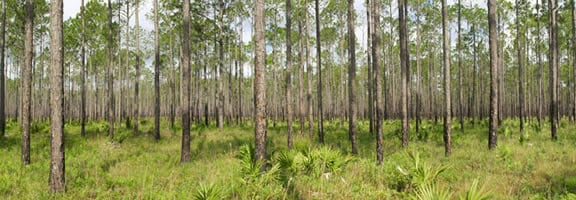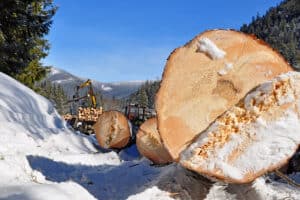When people are looking to buy recreational property, information about the timber on a property can be the toughest thing for a buyer to understand. Certainly, buyers will know plenty about what types of features they are looking for, but turn a discussion to types of timber, and things can get pretty confusing quickly.
With that in mind, here are four questions that recreational buyers should ask when they are learning about the timber on a recreational property:
Q: Does my agent understand timberland and the markets for timber?
A: If your agent doesn’t have experience understanding and explaining timber values, the agent should bring someone in to help who has that knowledge. Otherwise, there’s a chance you might not pay the appropriate price for a property, based on incorrect information.
Make sure the valuation of the timber on a property is directly related to that tract’s timber – that the value hasn’t been derived by pulling in per-acre prices from nearby properties. Timber on one property is never exactly the same as another, even if the other property is just down the road.
Q: How can I have confidence in what I am buying from a timber perspective?
A: If the timber component of the property is a major reason for your purchase, it’s a good idea to be comfortable with the timber inventory on the property. Confidence comes from having a complete forest inventory, which will give estimates of acres in each timber stand, such as a 5-year-old pine plantation, 23-year-old pine plantation, mature hardwood bottomland, non-forested areas such as ponds, etc., as well as providing volume estimates.
A forest inventory is comprehensive and gives a good “layout” of the forest on paper, as opposed to what’s called a “timber cruise”, which usually provides only the volumes of merchantable timber.
Through analysis of the inventory, buyers and their agents can assess whether the property is reasonably priced and worthy of making an offer. Many knowledgeable buyers may be able to just look at the timber without performing an inventory and get a good “ballpark” estimate of whether the property is reasonably priced. But the larger the property, the more difficult this becomes, and the more important it becomes to have an inventory.
Q: How do I get a handle on how I might want to manage the property from a timber perspective?
A: A knowledgeable agent should be familiar with forest management practices and can get you in touch with a forestry management professional, such as an Association of Consulting Foresters (ACF) forester, who can help you determine management goals for a property. Also, there are numerous brokerage firms that can provide management and/or valuation services.
Q: How can I figure out if I can expect to get cash flow from timber on a property?
A: It’s important to have quantifiable, realistic information and goals in regards to potential timber cash flows. This ties into setting your overall goals for the property.
For example, are you looking for ongoing, consistent returns from the timber, or would such cash flow be a bonus as you do selective clearing related to wildlife management and aesthetics?
As part of this decision-making, make sure you and your agent understand the current demand for the types of timber on your property. A good forest manager will know the timber markets and will be able to help you time your timber sales to maximize your revenue potential.
Josh Barkhimer is a broker with United Country-Neeley Forestry Service, based in Camden, Ark. He specializes in helping recreational property buyers in Arkansas, and is a member of Potlatch Corp.’s Preferred Broker Network.
This content may not be used or reproduced in any manner whatsoever, in part or in whole, without written permission of LANDTHINK. Use of this content without permission is a violation of federal copyright law. The articles, posts, comments, opinions and information provided by LANDTHINK are for informational and research purposes only and DOES NOT substitute or coincide with the advice of an attorney, accountant, real estate broker or any other licensed real estate professional. LANDTHINK strongly advises visitors and readers to seek their own professional guidance and advice related to buying, investing in or selling real estate.










The vast majority of listed land tract is with agents that have little or no value of timber. Even if there is a cruise available the agent does not have the expertise to discuss it with a buyer ro seller. I am a SC Regsistered Forester as well as a broker with many experience and upsets me to see timberland or any tract with significent timber value listed with a residental type sales agent.